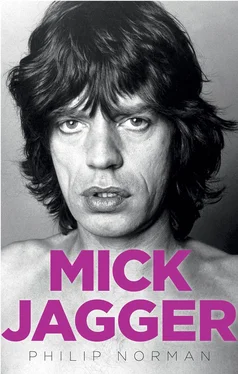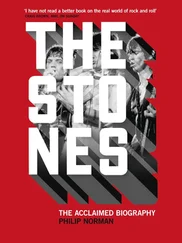After serenading her with Bo Diddley’s ‘Pretty Thing’ a few times, he asked her for a date, naming an afternoon the following week and suggesting Windsor, with its castle and fluttering Royal Standard, as their most convenient common ground. ‘It was the day of my grandmother’s silver wedding party, and I explained I’d have to go to that first. I remember meeting Mick on the street in Windsor because that was when I first saw him in daylight and realised one of his eyes was two colours – the left one was brown and green.’
For their next date, he took her down to Dartford by train, as she thought, to meet his family. After her father’s substantial Buckinghamshire farm, the Jagger family home struck her as ‘very ordinary’. Neither Mick’s parents nor his brother turned out to be there, and Chrissie realised he was hoping – or, rather, expecting – to have sex with her. But the seeming wild child was not the pushover he expected. ‘I was very worried about it and I wouldn’t stay,’ she recalls. ‘So I had to come back again on the train on my own.’
Mick forgave the rebuff, however, and a week or so later, after an early-ending gig, Chrissie took him home to Burnham by train to meet her parents, Ted and Peggy, also inviting Charlie Watts and her friend Liz Gribben, to whom Charlie had taken a shine. ‘My parents were slightly appalled by the way Mick looked, but they were impressed by the fact that he went to LSE, and my dad liked him because he was so bright and into money. I don’t think my mother ever really liked him – even before everything that happened – but Dad could always see how sharp he was and what a success he was going to be, whatever he ended up doing.’
Mick became a regular overnight visitor at the Shrimptons’, always occupying a separate room from Chrissie’s, as any well-brought-up young man in that era would be expected to do. After breakfast he would catch the same 8:42 commuter train from Burnham that Chrissie took to her secretarial school. ‘My sister Jean by that time was going around with a lot of debby Vogue types who’d sometimes be on the same train,’ she remembers. ‘I used to hear them whispering “Poor Chrissie . . . her boyfriend’s so ugly.”’
Chrissie, by contrast, spent little time in the bosom of the Jagger family, though that was a consequence of Mick’s desire to get away from home more than any mutual antipathy. She remembers her surprise on discovering that, unlike their elder son, neither Joe nor Eva had any trace of a Cockney accent and that both were ‘quite intellectual people, which my parents weren’t, though we had more money. Mick’s mother was quite simply a domestic slave, devoted to looking after the males of the household. She was one of those garrulous women, and Mick was often very irritated by her and very dismissive of her. And his father was very formal and – to me – charmless and rather alarming. But I did get on very well with his brother, Chris, who at that time was mostly away at school. We were the two Chrisses, the younger siblings of the more successful older ones.’
Very soon after that initial refusal, Chrissie began sleeping with Mick – something that for a genteelly raised, convent-educated seventeen-year-old in 1963 was still far from routine. The first time was at the Shrimpton family home while her parents were away, since she couldn’t bring herself to enter his bed at the squalid flat he shared with Keith, Brian and the ‘gobbing’ printer Phelge at 102 Edith Grove. ‘I hated it . . . it was so dirty,’ she recalls. ‘The spitting and the Nankering . . . and they’d got notes that girls had sent them pinned up all over the wall. It was an all-blokes place, where I was always made to feel like an intruder.’
Keith she remembers as ‘just a weedy little boy, who was very sweet and shy and upset about his parents having recently got divorced . . . Brian was very bright, and it was obvious that he and Mick didn’t get on at all. He tried to pull me a couple of times, but only to spite Mick. When it happened I can remember thinking “This is ridiculous because you’re half my size.”’
Mick had been seeing Chrissie only about two weeks when – out of nowhere – the Stones’ fortunes suddenly began to improve. A whole-page feature article on the Crawdaddy Club in the local Richmond and Twickenham Times gave them a laudatory plug. Then Giorgio Gomelsky persuaded a leading music trade journalist, Peter Jones of the Record Mirror – who had filed the first-ever national story on the Beatles – to come to the Station Hotel on a Sunday lunchtime and watch the Stones while Gomelsky shot further documentary footage of them onstage. ‘I met them in the bar, before they started playing,’ Jones remembers. ‘Mick was amiable and well spoken, but he stayed pretty much in the background. I thought Brian was the leader because he was the pushiest one, waving their single press cutting under my nose.’
Peter Jones was ‘knocked out’ by the set that followed, but cautiously said he wanted his paper’s in-house R&B enthusiast, Norman Jopling, to give a more knowledgeable assessment. Nineteen-year-old Jopling turned up at the Crawdaddy’s next Sunday session, but without great expectations. ‘British bands who tried to play the blues all had this kind of worthy, post-Trad feel, so I expected them to be rubbish. But as soon as Mick opened his mouth, I realised how wrong I was. All I remember thinking as the Stones played was “This stuff doesn’t only belong to black guys in the States any more. White kids in Britain can play it just as well.”’
When the band talked to Jopling afterwards, Brian again took the lead, quizzing him at length about what he could do for them in print. Mick was ‘a bit distant’, as if he resented his colleague’s assertiveness. ‘He knew Brian had started the band and was the leader, but he knew he was the guy people were looking at.’ Later, Jopling rode with them in Stu’s van to the house of a record producer, where Keith initiated an earnest discussion about Motown music and how disappointing Mary Wells’s latest single had been. ‘I remember that there were a lot of musical instruments lying around, Brian was picking them up and just playing them with that instinctive talent of his. But Mick was playing some, too – and I don’t mean only percussion instruments.’
Jopling’s article in the next week’s Record Mirror was the stuff of which careers are made:
As the Trad scene gradually subsides, promoters of all kinds of teen-beat entertainments heave a sigh of relief that they’ve found something to take its place. It’s Rhythm and Blues, of course. And the number of R&B clubs that have sprung up is nothing short of fantastic . . . At the Station Hotel, Kew Road, the hip kids throw themselves around to the new ‘jungle music’ like they never did in the more restrained days of Trad. And the combo they writhe and twist to is called the Rolling Stones. Maybe you haven’t heard of them – if you live far from London, the odds are you haven’t. But by gad you will! The Stones are destined to be the biggest group in the R&B scene if that scene continues to flourish . . .
After engineering such a triumph, Giorgio Gomelsky might have expected formal ratification as the band’s manager in time to handle the consequent surge of interest from record companies and talent agents. But all Gomelsky’s unselfish work on their behalf was suddenly forgotten. Before the Norman Jopling article had even appeared, Brian asked Jopling’s Record Mirror senior Peter Jones whether he’d consider taking on the Stones’ management. Jones was not interested – but once again proved a crucial catalyst. A couple of days later, he happened to run into a business acquaintance, a young freelance PR man whose naked ambition was a byword throughout the music trade press. If the young PR man cared to check out the Crawdaddy Club’s house band, Peter Jones suggested, he might find something of interest. And until the Record Mirror ’s rave appeared, the field would be clear. When Mick had played Jimmy Reed’s ‘I’ll Change My Style’ to his new Beatle friend John Lennon, he little imagined how prophetic the title would be.
Читать дальше












